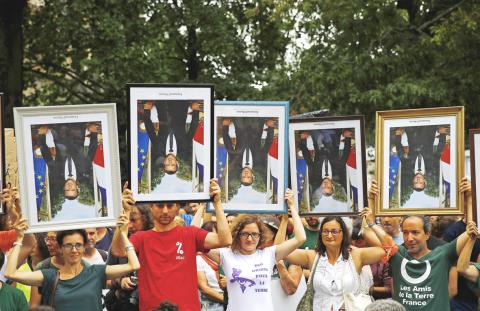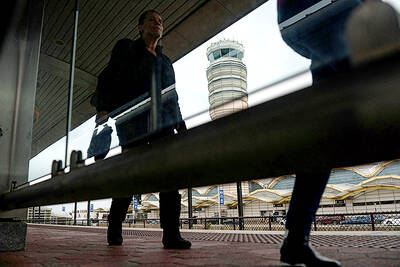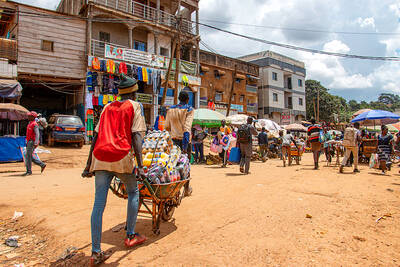Is stealing a presidential portrait a prison-worthy crime? Or a laudable act of civil disobedience?
Courts around France are grappling with this question in response to an unusual new environmental movement that is aiming to push French President Emmanuel Macron to do more to fight climate change.
One by one, environmental activists around France have removed Macron’s official portraits from more than 130 town halls this year, from the foothills of the Alps to the Left Bank of Paris.

Photo: AP
Their point: Even as Macron portrays himself on the global stage as Mr Climate, the centrist, business-friendly president is not acting boldly enough to change his own country’s planet-damaging ways.
They are notably angry that France has lagged on its international commitments to increase use of renewable energy and reduce emissions. France remains well behind its European neighbors in its use of renewable energy.
The portrait-removers have been facing trials around the country, with some fined, others acquitted.
An appeals trial of the first court case was held last week in Lyon with the ruling still pending, and a new trial is scheduled later this month.
The protesters do not fit a single mold — one is a math teacher, another works for the SNCF national rail company, another is an organic vegetable farmer.
At last week’s trial, defendant Helene Lacroix-Baudrion argued that the portrait removal was “an act aimed at taking care of life and our environment.”
“We just want Macron, who holds himself up as a climate defender, to respect France’s commitments under the COP21 [the 2015 UN climate agreement signed in Paris],” she said.
An expert working for the UN climate change agency testified as a defense witness at the trial, and climate activists gathered for a boisterous protest outside the courthouse.
The trials themselves have turned into public debates on civil disobedience, France’s rich tradition of protest — and of course, the environment.
France is divided over how, and how fast, to cut emissions blamed for worsening climate change.
Macron argues that he is doing more than most, and has stood up to US President Donald Trump on the need for countries and corporations to cooperate to cut emissions.
However, Macron backed down on a fuel tax last year meant to help wean France off fossil fuels, because the tax triggered the yellow vest protest movement against economic injustice, which saw months of violent protests that devastated some major shopping streets in Paris.
So activists started targeting Macron’s portraits, symbolically dethroning him to demand action.
Several brought stolen portraits to a march at the G7 summit Macron hosted in Biarritz in August, to try to embarrass him at the global event.
They brandished the pictures upside down, arguing that his climate policy is the opposite of what the planet needs.
French law says the acts can be considered “group theft,” which can be punishable by several years in prison.
No court seems willing to go as far as locking up the portrait-removers, but the verdicts have been mixed.
Six portrait-removers were convicted in the first trial, in Bourg-en-Bresse in June, but five were only given suspended fines. The sixth was fined 250 euros (US$280) because he already had a criminal record.
The court ruling said it was not clear how removing the portraits would “save humanity from ecological disaster” and argued that “other avenues were open to the defendants to defend their cause.”
The protesters, from the Non-Violent Action COP21 activist group, accepted the ruling, but the prosecutor appealed, seeking tougher punishment.
In September, a Lyon court acquitted two activists, ruling that they had a “legitimate motive” and that “climate upheaval is a constant fact that seriously affects the future of humanity.”
“Faced with the lack of respect by the state” for its climate commitments, the ruling reads, “the citizens’ means of expression in a democratic country cannot be reduced to the votes cast in elections.”
A few weeks later, a Paris court fined eight activists 500 euros each.
Nine more trials are scheduled in coming months, around the country

FRUSTRATIONS: One in seven youths in China and Indonesia are unemployed, and many in the region are stuck in low-productivity jobs, the World Bank said Young people across Asia are struggling to find good jobs, with many stuck in low-productivity work that the World Bank said could strain social stability as frustrations fuel a global wave of youth-led protests. The bank highlighted a persistent gap between younger and more experienced workers across several Asian economies in a regional economic update released yesterday, noting that one in seven young people in China and Indonesia are unemployed. The share of people now vulnerable to falling into poverty is now larger than the middle class in most countries, it said. “The employment rate is generally high, but the young struggle to

ENERGY SHIFT: A report by Ember suggests it is possible for the world to wean off polluting sources of power, such as coal and gas, even as demand for electricity surges Worldwide solar and wind power generation has outpaced electricity demand this year, and for the first time on record, renewable energies combined generated more power than coal, a new analysis said. Global solar generation grew by a record 31 percent in the first half of the year, while wind generation grew 7.7 percent, according to the report by the energy think tank Ember, which was released after midnight yesterday. Solar and wind generation combined grew by more than 400 terawatt hours, which was more than the increase in overall global demand during the same period, it said. The findings suggest it is

IN THE AIR: With no compromise on the budget in sight, more air traffic controllers are calling in sick, which has led to an estimated 13,000 flight delays, the FAA said Concerns over flight delays and missed paychecks due to the US government shutdown escalated on Wednesday, as senators rejected yet another bid to end the standoff. Democrats voted for a sixth time to block a Republican stopgap funding measure to reopen government departments, keeping much of the federal workforce home or working without pay. With the shutdown in its eighth day, lines at airports were expected to grow amid increased absenteeism among security and safety staff at some of the country’s busiest hubs. Air traffic controllers — seen as “essential” public servants — are kept at work during government shutdowns, but higher numbers

Elvis Nghobo tried to get into four different professional schools in Cameroon, but could not make it. Frustrated, the 34-year-old turned to selling food at a market in Yaounde, the country’s seat of power. Nghobo blames his woes on what he calls a corrupt education system that favors children of the elite. As the central African country prepares for Sunday’s presidential election, he said he would not be heading out to vote. He called the results a foregone conclusion for 92-year-old Paul Biya, the world’s oldest president, who has ruled for Nghobo’s entire life. “He is already too old to govern, and it’s boring